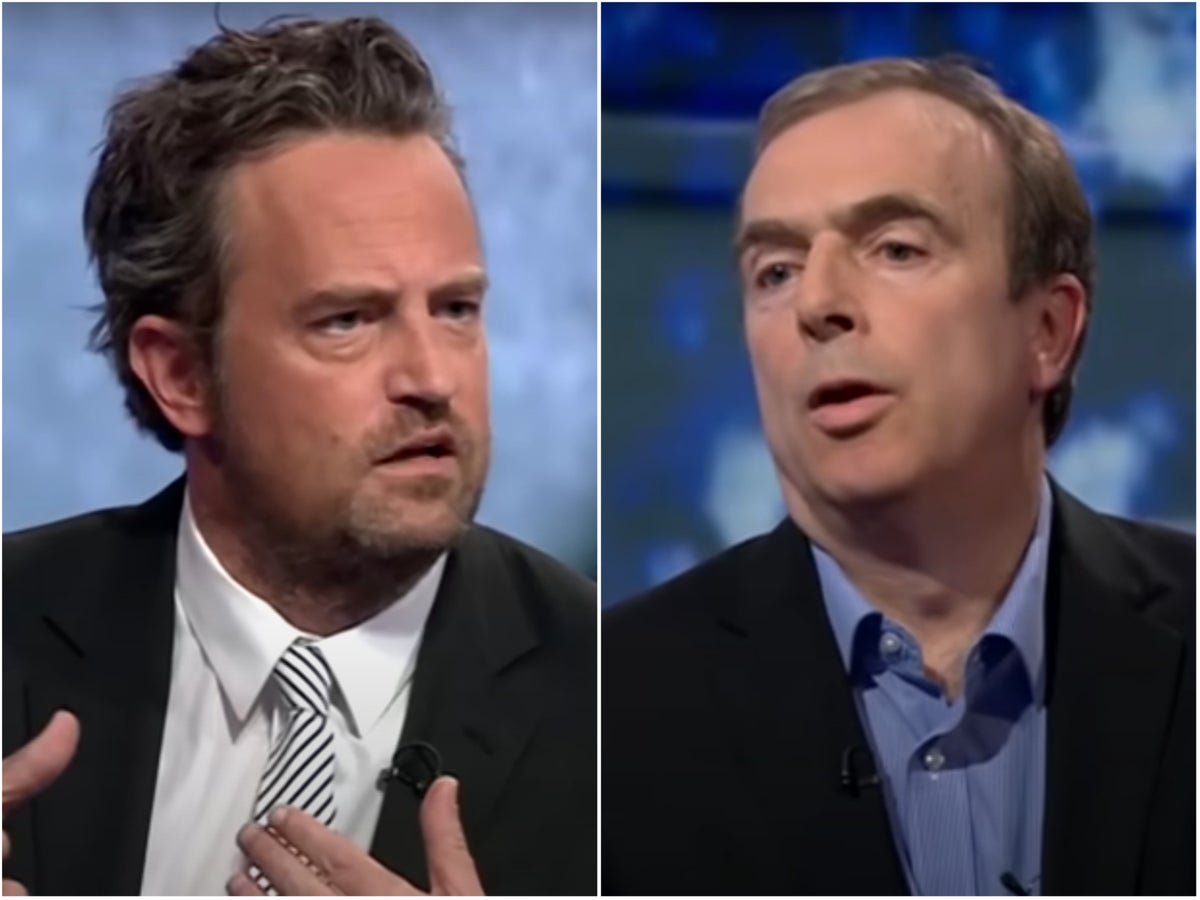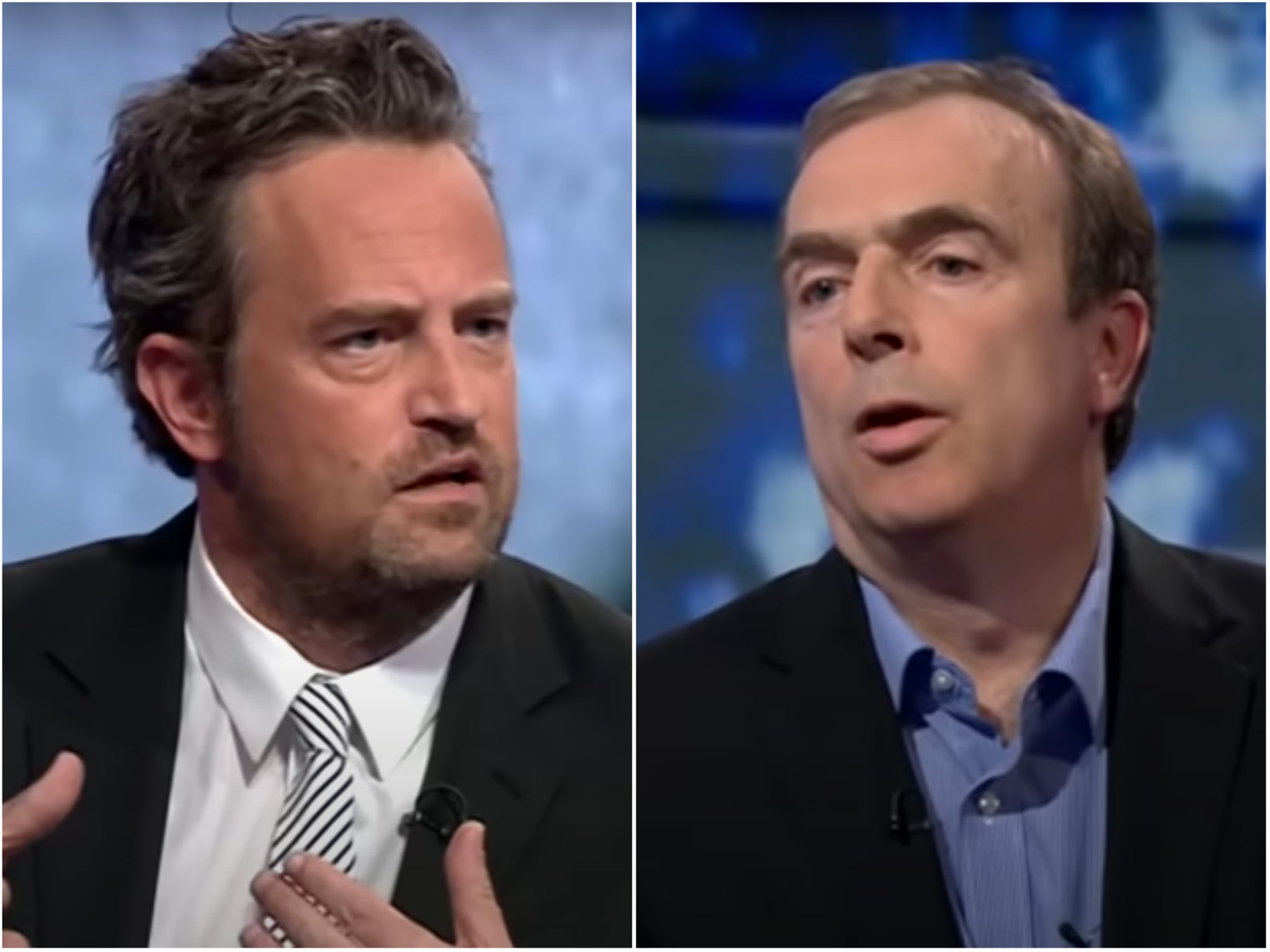
Matthew Perry, who has died suddenly aged 54, was known around the world as Chandler Bing, the saracastic king of the one-liner on the hit sitcom Friends.
Yet in his later years he also became a fierce advocate for addiction recovery, speaking frankly about his own struggles with drug and alcohol abuse over the years.
Outside of Friends, one of his most memorable TV appearances was in 2013, when he debated addiction on the BBC’s current affairs programme Newsnight with Baroness Meacher, an advocate for drug policy reform, and controversial author and broadcaster Peter Hitchens.
Perry was invited on to discuss specialist drug courts, in which former addicts would sit as magistrates in order to pass a more informed judgement on abuse-related offences by non-violent addicts.
“I know that they work,” he said on the programme. “People who go through drug court have a 55 per cent less chance of ever seeing handcuffs ever again.”
Hitchens – himself a strident anti-drug campaigner – vehemently opposed Perry’s stance, disputing the reality of drug dependency by describing a “fantasy of addiction” and disagreeing with its designation as a disease.
“The medical profession is constantly doing extraordinary things. The American Psychiatric Association said for years homosexuality was a disease – they were wrong,” the Mail on Sunday columnist said.
“You are making a point that is as ludicrous as saying Peter Pan is real,” Perry hit back.
Later on, Perry angrily referred to Hitchens as “Santa” and advised him to “read something other than your book”, referencing the writer’s essay The War We Never Fought: The British Establishment’s Surrender To Drugs.
From L-R: Matthew Perry, Baroness Meacher, Jeremy Paxman, Peter Hitchens on ‘Newsnight’ in 2013— (BBC)
Hitchens then accused Perry of treating a “very serious subject” with “immense levity”.
“The policy which you so smugly and loftily advocate, this policy has led to disaster in western countries for decades,” he said.
It apparently became so heated between the pair that the then-editor of Newsnight, Ian Katz, told the show’s producer to take them out of the BBC building via separate exits.
Perry recalled the tense exchange in his memoir, Friends, Lovers and the Big Terrible Thing, in which he also wrote about his struggles with addiction, visits to AA and treatment in various rehab facilities.
He remembered the panel being moderated by “a cranky guy called Jeremy Paxman who was famous for being rude to guests”.
The other panellists were Baroness Meacher, an advocate for drug policy reform, and “a complete tool called Peter Hitchens”, he wrote.
“I can’t imagine what it’s like to have a sibling whom everyone adores when you’re the idiot brother everyone loathes, but I think Peter could well be able to weigh in on what that feels like,” Perry said of Hitchens.
“The loss of Peter’s wonderful brother, the great [author] Christopher Hitchens, still reverberates – an unmatched raconteur, writer, arguer, and bon vivant, and the world mourns Christopher still, more than a decade after his brutal death from cancer.”

Perry continued: “Sadly, his younger brother, Peter, is still pontificating on things he has no idea about, mixing right-wing ideology with a kind of paternalism and moral tutting.”
Perry described Hitchens explaining his “bizarre view” that addiction was “a case of weak morals” and “wasn’t even a real thing”. He also says that the journalist sounded “like some insane great-aunt who’d had one too many glasses of sherry”.
“I like to think that both the Baroness and I ran rings around him – but frankly, that wasn’t hard,” he wrote. “He didn’t like that much, and eventually the interview ended with Paxman and Baroness Meacher simply laughing out loud at how stupid and cruel Hitchens sounded.”
Perry said that Hitchens proved “that he knew nothing about either me, or the subject on which he pontificated”, while Perry made him look “like the fool he is”.
Matthew Perry was involved in a heated debate about drug addiction and reform with Peter Hitchens on ‘Newsnight’
In a statement to The Independent after learning of Perry’s memoir remarks, Hitchens said: “‘I had no idea who Matthew Perry was when I was asked on to Newsnight to debate drug courts. When I arrived at the studio I found him there with a huge entourage, as if he was Henry Kissinger. I think that’s his problem. He never normally meets anyone who disagrees with him.
“That could be why, nine years later, the episode still rankles, and still strikes him as an important bit of his life. I tried to argue with him. He mostly responded by calling me names, and he still seems to be doing this. I have a rather low opinion of people who try to use my late brother’s memory against me, and I wish he had not done that.”
In his memoir, Perry wrote that he would take up to 55 strong painkillers each day to get through filming Friends. He claimed that fans of the show would be able to tell whether he was drinking alcohol or taking drugs from “season to season” depending on his appearance.
“When I’m carrying weight, it’s alcohol; when I’m skinny, it’s pills; when I have a goatee, it’s a lot of pills,” he said.
If you or someone you know is suffering from drug addiction, you can seek confidential help and support 24-7 from Frank, by calling 0300 123 6600, texting 82111, sending an email or visiting the website here.
In the US, the Substance Abuse and Mental Health Services Administration can be reached at 1-800-662-HELP.







